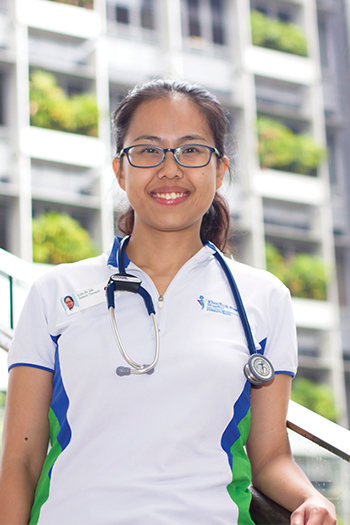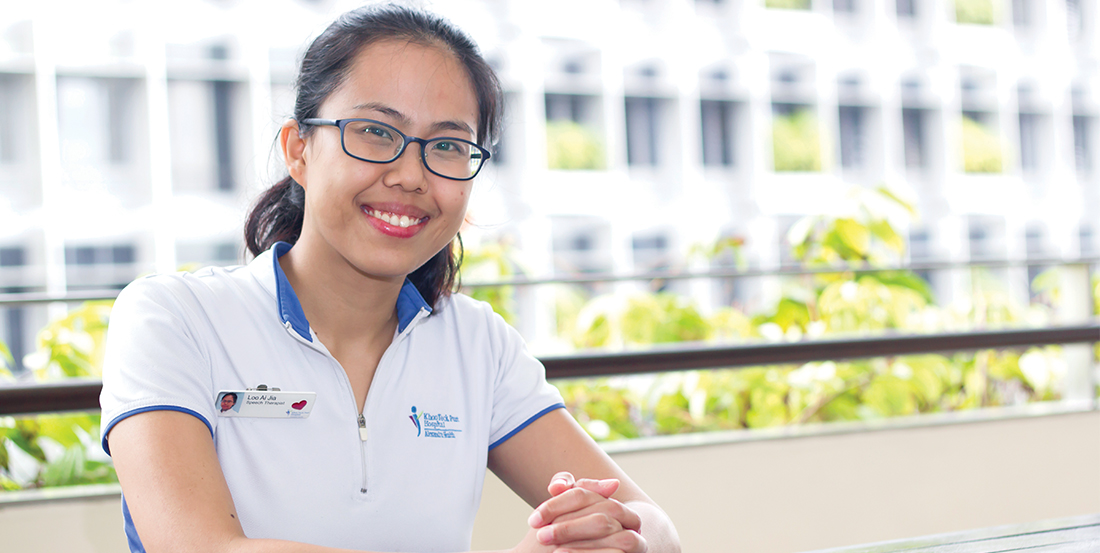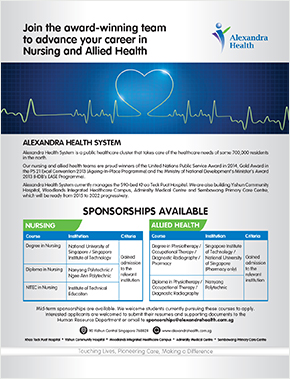I n the busy settings of Khoo Teck Puat Hospital (KTPH), there are empowering scenes of healthcare professionals tending to patients to the best of their abilities. Regardless of whether they are doctors or allied healthcare professionals, each provides a critical role that is important to ensure patient recovery.
KTPH, an institution in the healthcare group Alexandra Health System (AHS), is a comprehensive medical entity that merges the elements of quality healthcare, accessibility and comfort for patients. On top of this, AHS is also developing Yishun Community Hospital, Woodlands Integrated Health Campus, Admiralty Medical Centre and Sembwang Primary Care Centre. These new medical facilities will be part of AHS' care model to support our patients' healthcare journey with us.
Today, we speak to Ms Loo Ai Jia, one of the many unsung heroes that form the pillars at KTPH. A Healthcare Scholar with AHS, she shares her dreams and aspirations in the healthcare sector.

Loo Ai Jia
Healthcare Scholar
Designation:
Speech Therapist, Rehabilitation Services,
Khoo Teck Puat Hospital
What inspired you to choose a career in the healthcare sector?
Loo Ai Jia: After being in the business development field for a while, I felt that I was tirelessly chasing after something that wasn't meaningful. This made me contemplate a career switch. At the same time, I recalled the satisfying volunteer work I used to do thanks to my mother, who is a nurse. This recollection prompted me to explore a healthcare career as my next career move.
Apart from my mother, I had two other friends who were also healthcare professionals. They were speech therapists who gave me the unique opportunity to observe them at work in two different hospitals. My experiences affirmed my decision about a career in the healthcare sector.
What developments or opportunities have you gained as a Healthcare scholar?
Ai Jia: I was given the opportunity to pursue the Master of Speech Pathology at Melbourne's La Trobe University, one of the pioneers in speech pathology education. This gave me the chance to meet other like-minded individuals and build up a support network during my two-year course.
While I was in Melbourne, I also had the opportunity to work in a private acute care hospital. I was given the opportunity to follow up with patients over a course of two months. I also gained exposure to pediatrics when I worked with teachers at a local school to come up with therapy plans for children with language disorders. This well-rounded experience taught me a lot about my own strengths and weaknesses. It also equipped me with the basic knowledge and confidence when I started training at KTPH.
What are your roles and responsibilities as a Speech Therapist?
Ai Jia: As a speech therapist, I work with patients who have difficulties in communication and swallowing. I have to plan each patient's diet, provide them with instructions on how to improve their conditions and implement targeted rehabilitation exercises. I am also involved in caregiver training to ensure that recommendations and therapy are carried out effectively at home.
I am also part of a multidisciplinary team that includes other medical and allied health professionals. All of us work towards the same goal – to provide holistic care for our patients.

What are some challenges you face at work?
Ai Jia: As a clinician in a hospital setting in Singapore, I work with patients from different cultures and age groups. Most of the elderly in Singapore are not well versed in speaking English or Mandarin. It was difficult to build rapport. Moreover, my role as a speech therapist requires me to communicate effectively in order to give a fair assessment.
Thanks to the therapy assistants who help us with translation, I started to pick up different dialects from them. I also took up Malay language tuition sessions with a colleague. Today, I can communicate fluently in Hokkien, as well as basic Cantonese and Malay. This has certainly boosted my confidence level and helped me build rapport with my patients!
What memorable episodes have you had as a speech therapist?
Ai Jia: Episodes that allow me to see my patients discharged well and happy give me great satisfaction. I remember seeing a patient over a course of 3 months. I first saw her with my supervisor when she was in the Intensive Care Unit (ICU), and I followed up on her therapy plans after she was transferred to a general ward. Sometime later, she was able to produce voice and communicate with her family after learning how to use a speaking valve effectively. I still remember the smile on her face when she called and spoke to her sister on the phone for the first time.
What advice would you have for aspiring healthcare scholars?
Ai Jia: Healthcare scholars must possess three qualities – empathy, professionalism and communication skills. A sense of empathy is important in order to feel compassion for the patients in our care.
We also need to be professional and tactful in our approach to situations that require us to deal with patients, their families, as well as other members in our multidisciplinary healthcare team.
One final word of advice I would have for aspiring healthcare scholars is this: pursue your passion, persevere, and don't look back once you have embarked on this journey. The shift of focus from short-term care in acute hospitals to a more holistic healthcare approach certainly translates to exciting times for all future scholars.

